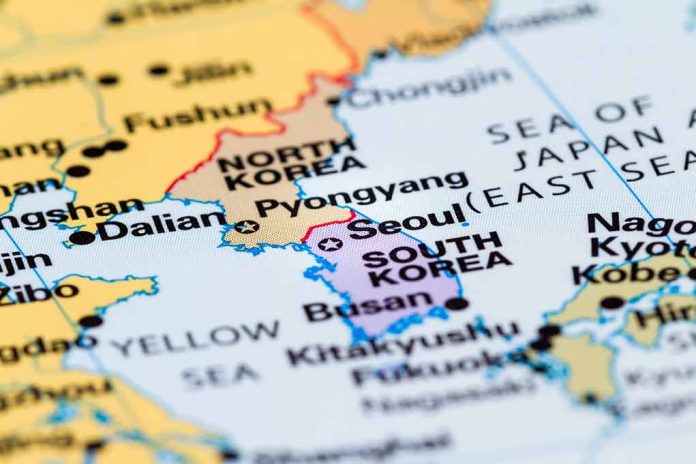
The impeachment against South Korean President Yoon Suk-yeol, spearheaded by opposition leader Lee Jae-myung, has captured the nation’s attention with its potential to reshape the country’s political landscape.
At a Glance
- Lee Jae-myung pushed for President Yoon’s impeachment for national stability.
- Impeachment proceedings are set amidst plummeting approval ratings for Yoon.
- Yoon was impeached on December 16, 2024.
Political Turbulence in South Korea
Lee Jae-myung, leader of the Democratic Party, advocated for the impeachment of President Yoon. He asserted that impeachment was necessary to restore national order amidst the turbulent political climate. Amidst public dissent and declining approval ratings, Lee stresses the need for lawmakers to prioritize citizens over political parties and emphasizes that history will remember their decisions.
Public protests have surged, demanding Yoon’s resignation. In response, South Korea’s Parliament planned an impeachment vote for Saturday. The motion required 200 votes for approval, leading to President Yoon’s suspension and subsequent deliberation by the Constitutional Court.
South Korean opposition leader Lee Jae-myung sought to force through a highly contested budget Tuesday in a show of political clout as he seeks to build momentum for another impeachment bid against President Yoon Suk Yeol https://t.co/g2kIskvpFx
— Bloomberg (@business) December 10, 2024
Mounting Pressure on President Yoon
President Yoon’s leadership is under scrutiny, facing allegations of insurrection and declining political support. Noteworthy is Yoon’s martial law declaration, defending it on the grounds of protecting democracy amid law enforcement actions facing public opposition. Diminishing support from allies further complicates Yoon’s position with legal experts questioning the constitutional implications of current power-sharing proposals.
“Impeachment is the fastest and the most effective way to end the confusion.” – Lee Jae-myung
His impeachment follows the failed first attempt previously blocked by the ruling People Power Party. With cabinet resignations and prosecutors considering criminal charges against Yoon, the political landscape remains dicey, raising questions about governance amid the ongoing crisis.
🇰🇷⚖️ South Korean opposition leader pushes for President Yoon's impeachment
Tickers of interest: $EWY
Opposition leader Lee Jae-myung has called for President Yoon Suk Yeol's impeachment, citing constitutional violations after Yoon's brief imposition of martial law on Dec. 3.… pic.twitter.com/63ggwVRkYG
— PiQ (@PiQSuite) December 13, 2024
Legal and Political Considerations
President Yoon will temporarily step down, with the Constitutional Court hearing the case. Meanwhile, the nation grapples with potential legal ramifications concerning election integrity due to controversial military deployments at the National Election Commission. Such dramatic developments are pivotal in understanding South Korea’s political situation, as shifts amid political unrest loom.
As the situation intensifies, the global community watches closely, considering implications for regional stability and potential shifts in governance should the current administration fail to withstand the political pressure. South Korea faces a crucial juncture critical in shaping its democratic principles and addressing national stability.
Sources
1. South Korean opposition leader says Yoon must be impeached
2. South Korea opposition leader urges president’s party to back impeachment over martial law














